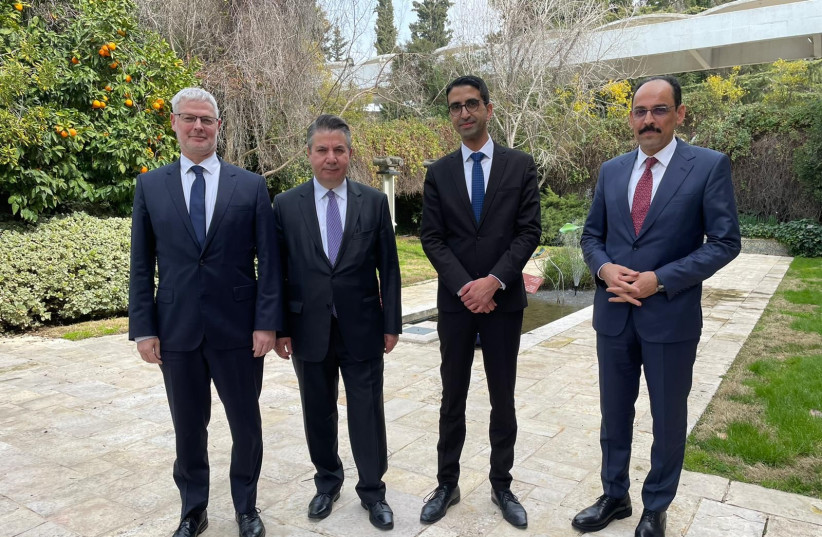The visit of President Isaac Herzog to Greece and Cyprus is another step toward cementing a friendship that started to take shape more than twelve years ago. Different governments and politicians from all sides have remained committed to preserving and advancing a win-win cooperation that is steadily expanding. For example, the December 2021 trilateral Israel-Cyprus-Greece summit in Jerusalem, showcases the determination of Prime Minister Naftali Bennett to continue the policy of his predecessor Benjamin Netanyahu vis-à-vis Greece and Cyprus. Joint economic, energy, military, cybersecurity and cultural actions, in parallel with the ongoing fight against antisemitism and the necessity for closer EU-Israeli relations, mark some of the joint interests.
Herzog’s visit captures the attention, not only as an indication of continuity in the trilateral partnership, but in terms of timing. As well, Herzog is expected to travel to Turkey and meet his counterpart President Recep Tayyip Erdogan a few weeks later, in March. The chronological order could be symbolically meaningful. Jerusalem does not see the potential rapprochement with Ankara as a factor impacting on its excellent relations with Athens and Nicosia. It is diplomatically acting to ensure that similar concerns, if any, might be appeased.
The rewarming of Israeli-Turkish ties is a particularly delicate affair. Trust will hardly be restored as long as Turkey does not halt its support for Hamas, the Islamist group that controls the Gaza Strip. Several other disagreements persist. They go beyond Ankara’s general posture on the Palestinian question to the ambition of Erdogan, coined as a revisionist by numerous scholars, in pursuit of his own agenda in the Mediterranean and the Middle East.
Israel and Turkey endeavor to compose differences to a level where a minimum understanding will be reached. For example, in a few cases, good coordination between the two has the capacity of restraining the influence of Iran. This has been tested in anti-Hezbollah synergies in Syria and in the Armenian-Azerbaijani war last year. However, it is debatable whether Ankara shares Jerusalem strategic sensitivities or counts on opportunism to repair the bilateral relationship. In his November Tehran visit, Turkish Foreign Minister Mevlut Çavusoglu spoke about ongoing talks on a road map for a long-term, comprehensive cooperation between Turkey and Iran, and expressed his support for the Joint Comprehensive Plan of Action (JCPOA), the Iran deal.
Israel is entering talks with natural skepticism and from a position of strength. In the final account, it is Turkey that demonstrates hastiness in mending ties following years of serious tension. In tandem with Israel, it is systematically approaching Egypt, Saudi Arabia and the United Arab Emirates (UAE). The problematic status of the Turkish economy is the obvious reason for such a choice. Perhaps, this is also part of a grand bargain between the Turkish government and the Biden administration about the future orientation of Ankara’s foreign policy, the degree to which it could be aligned with US geopolitical calculations and compatibility with NATO commitments. If Israel discovers that throughout the process it is able to make arrangements by which Turkey’s future actions somehow serve its national security goals, it will have every reason to be cautiously engaged.

The regional and international environment is not static. The dramatic deterioration of Israeli-Turkish relations since 2008 can be arguably reversed, under circumstances that render a rapprochement mutually desired. Greece and Cyprus monitor developments in the hope that Turkey might display sincerity and behave responsibly in a turbulent neighborhood. In this spirit, Israel’s leverage in fostering inclusivity in the Eastern Mediterranean and beyond should not be ignored. It is naïve to expect the parallelization of thinking of Israel, Greece, Cyprus and Turkey, but it is possible to envisage outcomes where the risk of confrontation will be reduced and the room for collaboration will be increased.
The writer is a research associate at Bar-Ilan University’s Begin-Sadat Center for Strategic Studies, a senior fellow at ELIAMEP and a lecturer at the European Institute of Nice.
